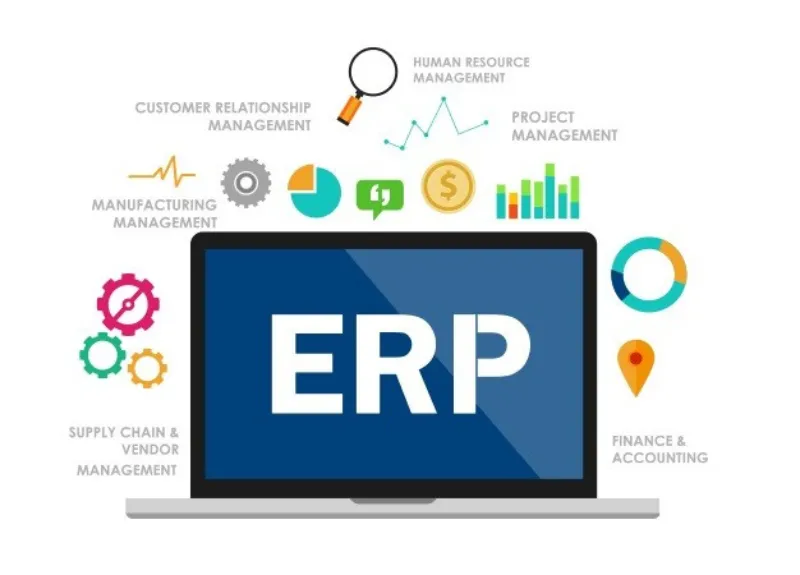Introduction: The Convergence of ERP and Blockchain in Manufacturing
The manufacturing industry is constantly evolving, driven by new technologies that aim to enhance efficiency, transparency, and security. Two of the most impactful technologies in recent years are Enterprise Resource Planning (ERP) systems and blockchain technology. While ERP systems have long been the backbone of manufacturing operations, integrating them with blockchain technology brings new opportunities for innovation and growth. This convergence is redefining how manufacturers manage their supply chains, quality control, and data security.
What is Blockchain Technology?
Blockchain is a decentralized digital ledger that securely records transactions across multiple computers. It ensures that data is transparent, tamper-proof, and accessible only to authorized parties. Blockchain’s core attributes—transparency, security, and immutability—make it an ideal solution for industries like manufacturing, where tracking, verification, and compliance are critical.
How ERP and Blockchain Work Together in Manufacturing
Integrating blockchain technology with ERP systems offers numerous benefits for manufacturers, combining the robust process management of ERP with the secure and transparent capabilities of blockchain. This integration enhances supply chain visibility, improves data security, and fosters better collaboration among stakeholders.
Key Benefits of ERP and Blockchain Integration
1. Enhanced Supply Chain Transparency
Blockchain technology provides a transparent and immutable record of every transaction and movement within the supply chain. When integrated with ERP systems, this transparency allows manufacturers to track raw materials, components, and finished products from their origin to the end customer.
– Example: Manufacturers can verify the authenticity of materials, track their movement in real time, and ensure compliance with industry standards and regulations. This transparency helps to prevent fraud, reduce counterfeiting, and build trust among stakeholders.
2. Improved Data Security
One of the main advantages of blockchain is its inherent security features. Every transaction recorded on a blockchain is encrypted and linked to previous transactions, creating a secure and tamper-proof chain of data. When combined with an ERP system, this security layer protects sensitive manufacturing data, such as financial records, supplier contracts, and intellectual property.
– Expert Insight: By integrating blockchain, manufacturers can reduce the risk of data breaches and ensure that critical information remains secure and only accessible to authorized users.
3. Streamlined Quality Control and Compliance
Blockchain’s immutable ledger allows manufacturers to record every step of the production process, ensuring quality control and compliance with regulatory requirements. ERP systems can use blockchain data to provide real-time insights into production quality, detect defects early, and reduce waste.
– Benefit: Enhanced traceability makes it easier to identify and address quality issues, resulting in fewer recalls and increased customer satisfaction.
4. Faster and More Efficient Transactions
ERP systems integrated with blockchain can automate and streamline transactions between suppliers, manufacturers, and customers. Smart contracts—self-executing contracts with the terms of the agreement directly written into code—can automate payments, reduce delays, and eliminate the need for intermediaries.
– Example: A smart contract could automatically release payment to a supplier once raw materials are delivered and verified on the blockchain, reducing administrative costs and speeding up the supply chain.
5. Better Inventory Management
Combining ERP with blockchain can optimize inventory management by providing real-time data on stock levels, locations, and movement. This integration helps manufacturers maintain optimal inventory levels, reduce carrying costs, and avoid stockouts or overstock situations.
– Tip: Use blockchain data to set automated reorder points within the ERP system, ensuring just-in-time (JIT) inventory management.
Real-World Applications of ERP and Blockchain in Manufacturing.
– Automotive Industry: Automotive manufacturers can use blockchain to track the provenance of parts and materials, ensuring they meet safety standards and regulatory requirements. ERP systems can integrate this data to streamline production schedules and improve supply chain visibility.
– Pharmaceutical Manufacturing: Blockchain provides an immutable record of every stage in the drug manufacturing process, from sourcing raw materials to production and distribution. ERP systems can use this data to ensure compliance with stringent regulatory requirements and improve traceability.
– Aerospace Manufacturing: Blockchain helps aerospace manufacturers track and manage the complex supply chain of parts and components, ensuring transparency and reducing the risk of counterfeit parts. When integrated with ERP, manufacturers can optimize their procurement, production, and maintenance processes.
Future Directions: The Next Steps for ERP and Blockchain in Manufacturing
As the integration of ERP and blockchain technology becomes more widespread, we can expect further advancements in areas such as:
– Advanced Analytics: Combining blockchain data with ERP analytics tools to provide deeper insights into production efficiency, supply chain performance, and risk management.
– IoT and Blockchain Integration: Using IoT devices to feed real-time data into ERP systems, validated by blockchain for improved accuracy and traceability.
– Sustainability Tracking: Leveraging blockchain’s transparency to track and verify sustainable practices throughout the manufacturing process.
Final Thoughts
The integration of ERP and blockchain technology offers a powerful combination that can revolutionize the manufacturing industry. By enhancing transparency, improving data security, and streamlining operations, this convergence helps manufacturers achieve greater efficiency, compliance, and customer trust. As these technologies continue to evolve, their potential to transform manufacturing will only grow, making them an essential consideration for any forward-thinking manufacturer.
